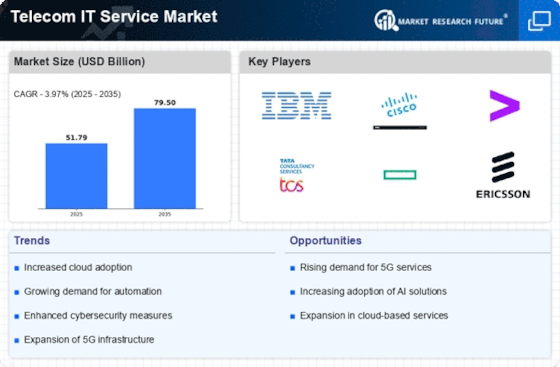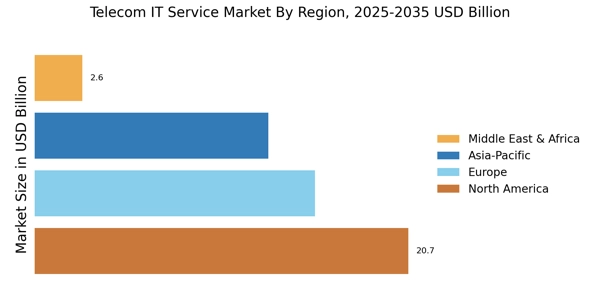Adoption of 5G Technology
The rollout of 5G technology is a pivotal driver for the Telecom IT Service Market. With its promise of ultra-fast connectivity and low latency, 5G is set to revolutionize various sectors, including healthcare, automotive, and entertainment. The global 5G services market is anticipated to grow significantly, with estimates suggesting it could reach USD 700 billion by 2028. Telecom companies are investing in IT services that support the deployment and management of 5G networks, which require sophisticated infrastructure and software solutions. This transition not only enhances user experience but also opens new revenue streams for telecom operators, thereby solidifying the Telecom IT Service Market's position in the technology landscape.
Expansion of Cloud Services
The expansion of cloud services is a significant driver for the Telecom IT Service Market. As businesses migrate to cloud-based solutions, telecom operators are adapting their IT services to support this transition. The cloud services market is projected to grow to USD 500 billion by 2025, with telecom companies playing a vital role in providing infrastructure and support. This shift allows for greater scalability, flexibility, and cost-effectiveness, which are essential for modern enterprises. Telecom operators are increasingly offering IT services that facilitate cloud integration, enabling businesses to leverage the full potential of cloud technologies. This trend indicates a promising trajectory for the Telecom IT Service Market as it aligns with the evolving needs of businesses.
Growing Importance of Data Analytics
Data analytics has emerged as a crucial component within the Telecom IT Service Market. As telecom operators collect vast amounts of data, the ability to analyze and derive actionable insights becomes paramount. The market for telecom analytics is projected to grow at a CAGR of 20% over the next five years, driven by the need for improved decision-making and customer personalization. Telecom companies are increasingly leveraging analytics to optimize network performance, enhance customer service, and develop targeted marketing strategies. This trend underscores the importance of IT services that facilitate data management and analytics, positioning the Telecom IT Service Market as a key player in the data-driven economy.
Regulatory Compliance and Security Needs
The Telecom IT Service Market is significantly influenced by the growing emphasis on regulatory compliance and security. As data breaches and cyber threats become more prevalent, telecom companies are compelled to invest in IT services that ensure compliance with stringent regulations. The market for telecom cybersecurity solutions is expected to reach USD 30 billion by 2025, reflecting the urgent need for robust security measures. Telecom operators are increasingly adopting IT services that provide comprehensive security frameworks, protecting sensitive customer data and maintaining trust. This focus on compliance and security not only mitigates risks but also enhances the overall reputation of the Telecom IT Service Market.
Increased Demand for Digital Transformation
The Telecom IT Service Market is experiencing a surge in demand for digital transformation services. Organizations are increasingly adopting advanced technologies to enhance operational efficiency and customer engagement. According to recent data, the market for digital transformation in telecom is projected to reach USD 100 billion by 2026. This growth is driven by the need for improved service delivery and the integration of innovative solutions such as AI and machine learning. As telecom companies strive to remain competitive, they are investing heavily in IT services that facilitate seamless transitions to digital platforms. This trend indicates a robust future for the Telecom IT Service Market, as businesses recognize the necessity of evolving their IT infrastructure to meet changing consumer expectations.

















